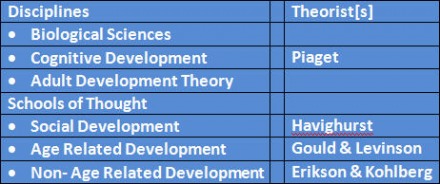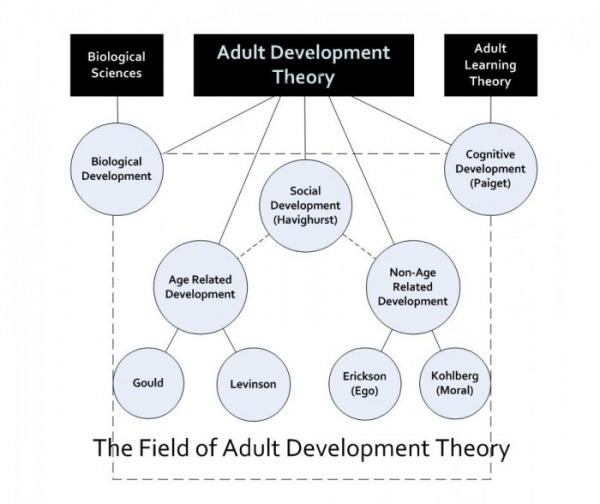Adult Development
Guide to this Section:
In the left hand column of the table below are the topics I cover on this page. They include an overview of disciplines related to adult development and a summary of the schools of thought within the field. In the right hand column, are representative theorists. You can find more information about their ideas by making a selection from the drop-down menu under the Theory tab, above.
Theories and Theorists - The Family Tree
There is no single theory that explains adult development, and there is no single hierarchical chart that explains the relationships between the theories that do exist. While the theories and theorists included herein are intended to be representational, they have also been selected with my personal interests (i.e., the university learner) in mind.
Adult development cannot be studied without touching on the biological sciences, which inform us about the aging process, and adult learning theory, which informs us about changing cognitive processes and learning requirements. Nonetheless, my goal was to isolate development – the ages and stages – to see how it might inform my teaching.
The following chart is a schematic of the field as I see it:
Adult development cannot be studied without touching on the biological sciences, which inform us about the aging process, and adult learning theory, which informs us about changing cognitive processes and learning requirements. Nonetheless, my goal was to isolate development – the ages and stages – to see how it might inform my teaching.
The following chart is a schematic of the field as I see it:
Adult Development Theory
Adult development is change, a progression from simple to complex behavior, from a less differentiated state to a more differentiated state (Mirriam. 1984) . Consequently, adult developmental theory often deals with 'stages and phases. These are ‘periods of stability, equilibrium and balance that alternate, in a largely predictable way, with periods of instability and transition’ (Smith, 1999).
At some stages, for example during infancy, biology influences development; at others, sociocultural or historic influences may be more powerful in shaping development. Still, two important themes recur throughout development theory: both the self and the "dream" are constantly reassessed in light of the reality of experience.
Cognitive Development
Cognitive development is the study of how people think and learn from childhood through adulthood. It includes information processing, reasoning, understanding, memory, intelligence, and language development. The most well-known and influential theory of cognitive development was developed by Swiss psychologist Jean Piaget.
Biological Sciences
There is still substantial scientific disagreement regarding even the basic nature of aging. There are three main theories (Goldsmith, 2009):
- Simple Deterioration - deterioration processes are biochemical
- Non-programmed Aging (also known as non-adaptive or passive aging) - aging is the passive result of being unable to better resist deterioration
- Programmed Aging (also known as adaptive aging, active aging, or aging-by-design) - Aging is an adaptation that results from the evolutionary process.
Schools of Thought
Social Development
This school of thought links development to roles and the expectations of society. From it emerged the idea that specific developmental tasks occur at certain times in life. These tasks, if successfully addressed, lead to greater likelihood of success with tasks later in life (Dean, 2007).
- Havighurst
Age related development
This school of thought holds the common belief that people of similar ages tend to experience the same developmental tasks (Dean, 2007).
- Gould
- Levinson
Non-age related development
This school of thought holds the common belief that people encounter the same developmental milestones in life, but they are not necessarily tied to chronological age (Dean, 2007).
- Erikson (ego development)
- Kohlberg (moral development)

